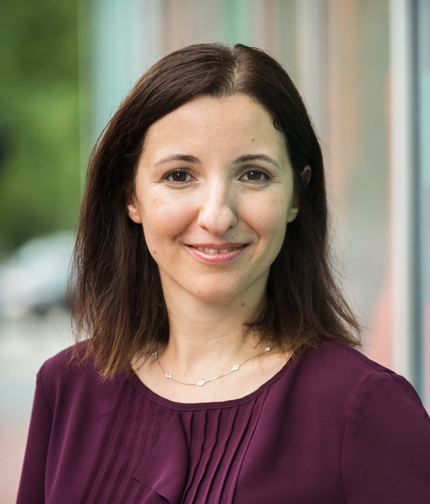Alina Oprea receives 2024 CyLab Distinguished Alumni Award
Michael Cunningham
Sep 4, 2024

Alina Oprea, professor in the Khoury College of Computer Sciences at Northeastern University, has been named CyLab's 2024 Distinguished Alumni Award winner.
“I am truly honored and grateful to the CyLab community for this recognition,” said Oprea. “I would like to thank everyone in CyLab who supported my journey in cybersecurity, starting with my Ph.D. advisor Mike Reiter, the founding faculty of CyLab, and my wonderful colleagues.”
Nominated by Vyas Sekar, Oprea’s former CyLab classmate and now Tan family professor in CMU's Department of Electrical and Computer Engineering, the award recognizes Oprea’s “foundational contributions to the theory and practice of trustworthy AI, including understanding the security and privacy risks of ML-based critical applications, and developing techniques to improve their resilience.”
Oprea was amongst the first CyLab students when CMU’s Security and Privacy Institute launched in 2003. She earned her Ph.D. in Computer Science from Carnegie Mellon University in 2007, where she was advised by Michael Reiter, CyLab’s founding technical director.
Oprea’s Ph.D. dissertation, Efficient Cryptographic Techniques for Securing Storage Systems, proposed new cryptographic approaches that provide rigorous security for networked storage systems and are efficient to implement in practice.
“At the time, several outsourced storage services for remote data backup were available long before cloud computing became widespread. However, the security of these services was not well understood,” said Oprea. “We developed new security mechanisms to protect this data, and that prepared me quite well for going to an industry research lab, where I started working more on cloud computing security.”
After graduating from CMU, Oprea spent nine years at RSA Labs as a principal and consultant research scientist. During this time, she conducted groundbreaking research on integrity protection for data stored in cloud systems, game theoretical modeling of cyber interactions, and utilizing AI to detect cyber attacks.
“We developed several techniques where we analyzed security logs, network logs, and web traffic in order to proactively detect anomalies and cyber attacks using machine learning,” said Oprea. “And some of these methods were actually deployed in an RSA product to protect organizations against cyber attacks. So that part was very rewarding to be able to see research incorporated into a real product, which is kind of rare for industry research.”
In 2016, Oprea joined Northeastern’s Khoury College of Computer Sciences as a tenure-track faculty member, where she has taught courses on cryptography, machine learning, and special topics courses on the security and privacy of machine learning. Currently, Oprea co-directs the Network and Distributed Systems Security Lab, which focuses on AI-enabled cyber defense, trustworthy AI, cloud security, and secure distributed systems. She is also a founding member of the Northeastern Cybersecurity and Privacy Institute.
As the co-author of numerous journal and peer-review conference papers, Oprea has participated in a large number of technical program committees (IEEE S&P, NDSS, ACM CCS, ACSAC, DSN) and is a co-inventor of 30 issued patents. Opera served as co-chair of the flagship security conference, the IEEE Symposium on Security and Privacy, in 2020 and 2021, and she will serve as its general chair in 2025 and 2026. She currently sits as an associate editor for the IEEE Security and Privacy Magazine.
Oprea has been recognized for her work and contributions to the field of cybersecurity through a number of awards, including a Best Paper Award at the 2005 Network and Distributed System Security Conference, the Technology Review TR35 award for research in cloud security in 2011, and the Google Security and Privacy Award in 2019.
Oprea says that her current research focuses on the area of trustworthy AI, which aims to analyze the security and privacy of machine learning algorithms and systems.
“Recently, we have been looking at privacy techniques in AI,” said Oprea. “Generative AI models are trained on sensitive user data, like user chat histories or email messages, and we really want to protect the privacy of the users when we train these AI models.”
In the CyLab Distinguished Alumni Award's fifth year, Oprea joins 2023 winner Aaron Roth, 2022 winner Michelle Mazurek, 2021 winner Yinglian Xie, and 2020 winner Elaine Shi.
Oprea will be presented with the award and give a talk on the security and privacy of generative AI at CyLab's annual Partners Conference on September 25, 2024.
